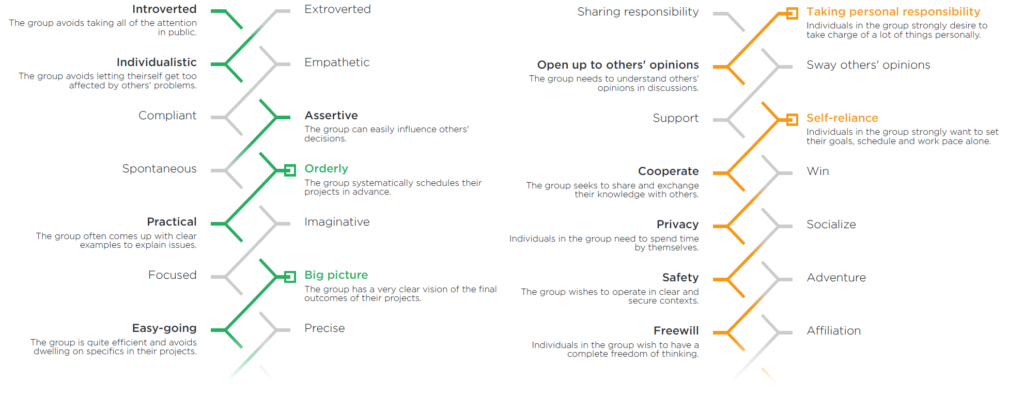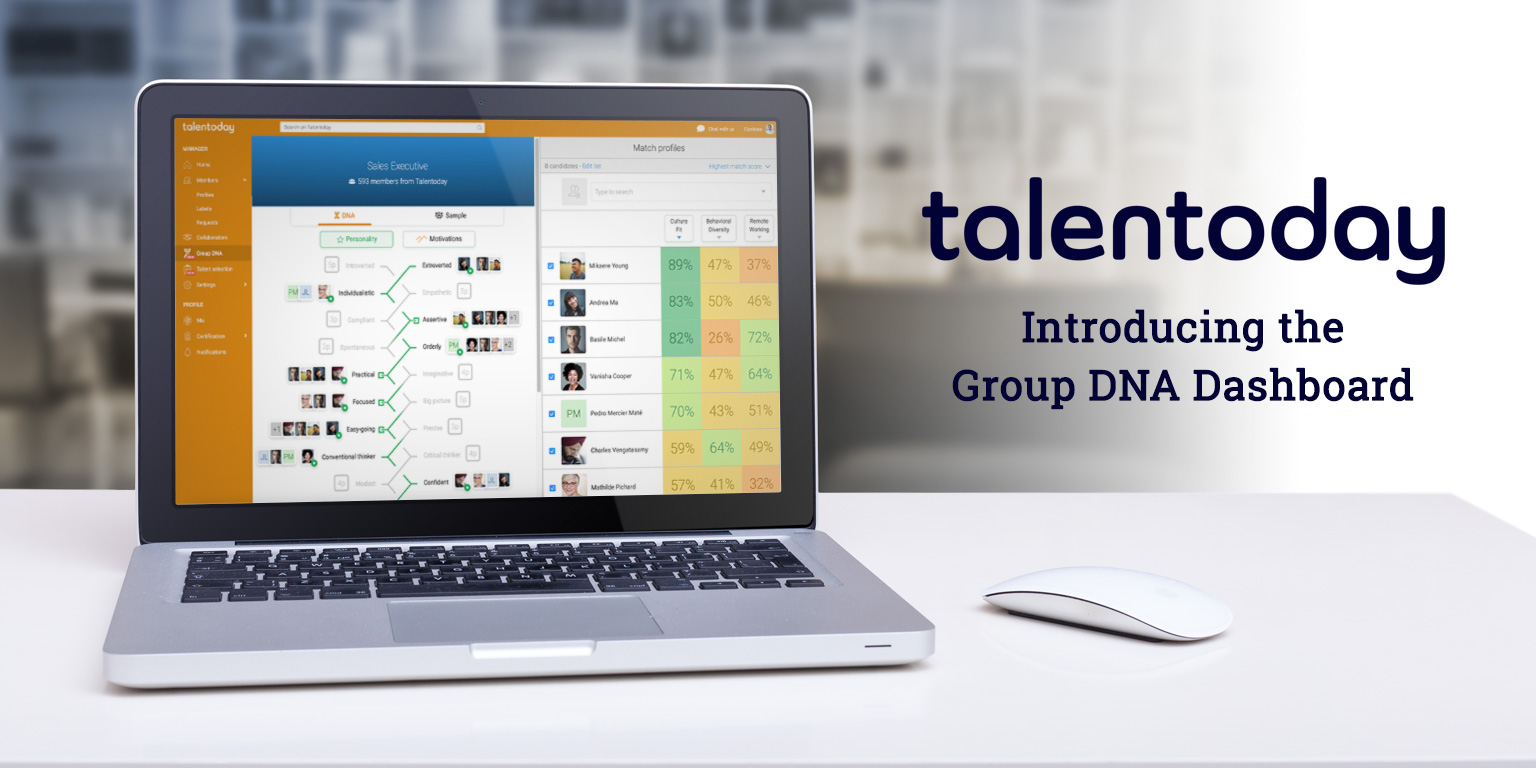Visualize Team Connections with the Group DNA Dashboard
Recruiting and building teams based on hard skills alone has proven to be an inefficient and incomplete hiring and management strategy in today's world of work. That’s why Talentobe has created the Group DNA Dashboard. It’s a new way to visualize the team profiling and talent matching tools first introduced by Group DNA (GDNA).
Now available in the Talentobe Manager platform, this powerful analytics tool leverages soft skill data to paint a complete cultural picture of a team, company or position. Users can also compare this key information alongside individual profiles to draw important connections between teammates.
Here’s how HR professionals can use the Group DNA Dashboard to power better decision making.
Discover the Group DNA Dashboard
Talentobe’s Group DNA Dashboard helps HR leaders visualize three key areas of people analytics: Culture Fit, Behavioral Diversity and Remote Work.
First, the new dashboard assesses culture fit, a key indicator of potential employee retention rate. This is done by evaluating how an individual matches with the predominant poles of the GDNA, zeroing in on personality traits and motivations that reflect the core values of the targeted team or company.
Second, the tool provides an analysis of behavioral diversity. This is a representation of the potential prevalence of diversity of thought, varied opinions and creative viewpoints in the workplace. To calculate this percentage, the GDNA Dashboard calculates the extent to which an individual diverges from the non-predominant poles of the Group DNA. The higher the percentage of distance, the more an individual can bring balance to the behaviors of a targeted team or company.
Finally, the GDNA Dashboard was built with today’s workplace in mind, dedicating space for key remote working insights. Individual profiles are compared against the results of our Remote Worker Group DNA profile to identify which teammates may excel in a work-from-home or hybrid environment.
Personalizing Your Results
In addition to visualizing these results all at once, users can also sort any matching results according to culture fit, behavioral diversity or remote working ability. This ensures that your decision making process can be as granular as you want it to be.
For example, a design team may be most interested in building their team around creative thinking. In this case, users could use the dashboard to maximize behavioral diversity matches.
On the other hand, a technology team may put more emphasis on boosting retention rates in a tight labor market. To attract the right talent with the skills needed to succeed, this might mean focusing on offering work flexibility and remote work opportunities. Therefore, this team’s dashboard may filter for remote work abilities to find the top matches in these asynchronous environments.
Visualize Team Connections with the Group DNA Dashboard
Interested in seeing how the Group DNA Dashboard helps leaders identify soft skills connections on their teams? Contact our Talentobe team today to learn more about how our latest feature is changing the way teams visualize and act upon soft skills data!
The Soft Skills DNA of Remote Workers
Remote workers have taken on growing significance in the U.S. workforce. In fact, a recent poll of employees showed that 39 percent would now consider quitting if their bosses did not provide some sort of work from home option. Clearly, employers need to take remote work seriously as they ponder how to build teams with the future of work in mind.
While remote work had been growing in popularity prior to the COVID-19 pandemic, the global health crisis turned work from home from a nice-to-have option into a necessity for a great deal of companies. The experience highlighted the advantages of a more flexible work environment for many employees and employers alike. However, as with any workplace, some workers adapted more easily to remote working conditions than others. The reason for these differences can be found in the science behind personality traits and workplace motivations.
Remote Work DNA
In an effort to help employers better understand this emerging workforce, psychologists at Talentobe used our Tailored Group DNA tool to create a soft skills model dedicated to remote workers. Users who access this tool within the Talentobe Manager platform will find the predominant personality traits and motivational needs that are necessary for a good adaptation to remote working conditions. Employers can then use this information to compare these benchmarks with the profiles of existing employees and potential job candidates.

Here’s a preview of our findings:
Predominant Personality Traits
- Orderly: When working from home, it pays to stay organized! This group prefers to schedule projects in advance.
- Big Picture: Even if the home office might be small, the goals for this group are big. Remote workers are more likely to have a clear vision of the final goals of their projects.
- Determined: This group sticks it out when the going gets tough, striving to overcome even the most difficult challenges.
- Positive: A shifting work environment is helped by the right mindset. These individuals have strong confidence in the future.
Predominant Motivations
- Taking Personal Responsibility: Remote workers know that they are the only ones around to hold them responsible for their actions. They tend to keep themselves accountable for their work and decisions.
- Self-Reliance: When you work from home, it pays to be able to set your own goals, schedule and pace of work.
- Personal Achievement: Goal setting is essential when it comes to the flexible work environment. Our research shows this group seeking to achieve highly difficult objectives.
- Intrinsic Enjoyment: When you work alone most of the time, you tend to find motivation from internal forces. Rather than being showered with external accolades, these workers prefer to achieve things for their personal satisfaction.
If recent history is any indication, remote work and other flexible forms of employment are here to stay. Employers looking to build the best teams possible need to start considering more than technical requirements for positions. By applying soft skills research to the hiring and team management process, employers can better predict employee success in a given workplace setting.
Are you interested in learning more about Group DNA from Talentobe? Click here to sign up for your free trial of Talentobe Manager, which includes our Group DNA tailored to the needs of the remote workforce.


